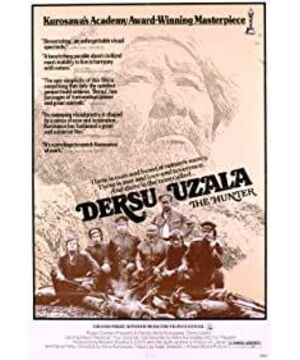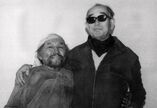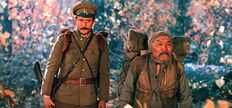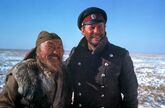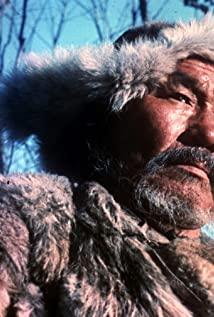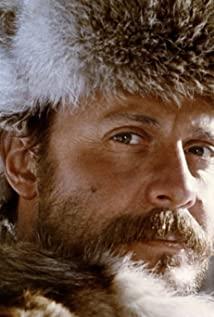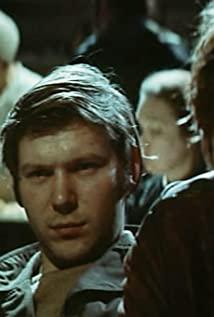1.
"Delsu Uzala" written in the front and released in 1975 won the Oscar for Best Foreign Language Film for Kurosawa that year. In the territory of Kurosawa Akira's work that is almost divided between Japanese modern dramas and costume warrior dramas, "Delsu Uzala" is a very special one: Kurosawa Akira's first directorial work after the suicide storm, co-produced by Su and Japan , Shooting overseas, telling the story of the Hezhe tribe and the Russians... Some of the styles of Akira Kurosawa's late works are revealed in this film.
2. "Delsu Uzala"
1. The background of the film-Kurosawa Akira's situation, and international politics
before "Delsu Uzala", "Red Beard" and "Tiger!" Tiger! Tiger! "Trolley Mania" made Kurosawa repeatedly frustrated: local investment could not satisfy the demanding "Kurosawa Emperor" demand, and the cooperation with Hollywood proved to be difficult to adapt, and the attempt to produce at a small cost ended in a box office failure. The effort to "rejuvenate serious movies" co-planned with Masayuki Kobayashi and other four veteran directors also aborted with the box office failure of "Train Madness"... In 1971, the embattled Akira Kurosawa tried to commit suicide by cutting his wrists. After the incident, Akira Kurosawa, who returned to public view, "became an amiable and approachable person", "as if giving up his identity as an exposer"-he began to accept interviews and participate in advertisements, of course, "superficially" Maybe it's just because he has been hurt too deeply." The failure of "Tram Mania" also seems to make Kurosawa even more convinced that epic films with big scenes are what he is best at and should shoot.
Regarding the origin of the film, Akira Kurosawa wrote in an article published in the 1974 "Japan Shonbo" that he had read the original work of "Delsu Uzara" very early ("30 years ago"). He also asked Eijiro Kuita to rewrite it into a script, trying to replace the background of the story with Japan, but felt "not quite right" (1951). After "Traction Madness", the Soviet director asked Akira Kurosawa at least twice if he wanted to make a film in the Soviet Union. He then raised his wish to shoot "Delsu Uzala", "That's how it was decided. "The script was completed by Akira Kurosawa and Yuri Najibine of the Soviet Union (Kurosawa wrote the first draft, rewritten it after processing by the other party, and then jointly studied the details).
Kurosawa Akira's simple and honest explanation seemed to make people at the time unsatisfied. It is said that the Soviet Union's "co-production" has an attempt to please Japan, hoping that the latter will invest in the economic development of Siberia. At the time, China, which was in tense relations with the Soviet Union, seemed to believe that behind this film there must be a major anti-China conspiracy by the Soviet Union.
The international political issue of tension between China and the Soviet Union also caused Kurosawa to have a headache. He said, "The way to deal with the Chinese... During the film scripting period, it is the most difficult problem." "I think it is fair to write. However, the other side (the Soviet Union) said that I had done too much to describe good Chinese people." Whether the film’s depiction of the Chinese ultimately satisfies the Soviet government is unknown; anyway, China feels greatly offended in this regard: the Chinese gangster "Red Beard" in the film, and the farmer Li Chunping's treatment of the Russian Arseny When Yefu knelt down, the official researchers were filled with righteous indignation and jumped.
The film cost 4 million U.S. dollars and lasted for four years, two of which were used for filming. In addition to Kurosawa himself, five other Japanese staff accompanied him to the Soviet Union. In terms of the difficulty of shooting, this film is probably one of the best among Kurosawa’s works: from the severe cold that once defeated Napoleon’s army, unpalatable food (drinking porridge becomes a luxury), problematic equipment, and the lack of animals (tigers). Cooperate with the intervention of the Soviet government.
2. Film analysis-content, style, and connotation The
film is divided into two parts. In the first part, Arsenyev was unable to find the cemetery of Delsu in 1910. Back in 1902, Arsenyev led a scientific expedition in the process of surveying and mapping maps in the Ussuri Forest, and living in the forest was simple The kind-hearted Hezhe hunter Delsu Uzala went from encountering and walking in groups (Delsu acting as a guide) to becoming a close friend and saying goodbye. With Delsu, he saved Arseniev’s life in the blizzard of the ice lake. For the climax; the second part tells that the two met again in the forest in 1907. Del Su gradually lost his eyesight due to old age. At the end of the expedition, Del Su returned to the city with Arsenyev, but finally could not adapt to city life, so he determined to return to the forest. , But was killed by bandits on the road, Arseniev rushed to hear the news, very sad.
There are many characters in the film, but the emotional connection is very simple and simple-in fact they only exist between Arseniev and Delsu Uzala. The rest, such as the members of the scientific expedition and Arsenyev’s family, can be regarded as supplements to "Arsenyev in the forest" and "Arsenyev in the city", while the gangsters "Redbeard", Li Chunping, a Tianjin farmer, is rather an event or landscape set up to show Del Su’s character. Arseniev, who has neither the character "prehistory" nor the clear "pursuit", also serves as a narrator, leading the audience's perspective as an "ordinary person"-admiring and admiring Delsu Uzala's rare experience, it seems to be this character main effect.
Delsu Uzala is the central character of the movie-in fact, "Delsu Uzala" is not so much telling a tortuous story as it is depicting the state of harmony between man and nature in Delsu. Conflict with urban civilization, and finally annihilation. Although he possesses special skills (marksmanship, subtle insight, and rich experience in survival in the wild), Del Su’s short and simple appearance and "kind and harmless" temperament (help people who may never meet, in The wooden shed leaves dry firewood, rice and salt for strangers), which is very different from the offensive "Superman" protagonist (samurai) often seen in Kurosawa's movies. The emphasis on the "naturalness" of its natural innocence is far better than the "heroicity". He talked to Flame, believed that the sun, moon, water and fire are spiritual, believed in dreams and ancient myths (memorial to relatives), and showed no concern for the precious money and comforts of mundane life.
The "scene" of the movie is not small, but this "big" is enriched by the natural scenery, and the characters are extremely small in the process. The "physical distance" between the audience and the characters, the sceneries, is unprecedentedly relaxed and sparse in Kurosawa's films. Large panoramas, panoramas, and calm and objective fixed shots run through, the most "close" is not the middle shots, the sports shots are extremely restrained, close-ups and close shots are rare. Moreover, it seems that the more emotional the moment, the more calm the scene is: the cheers when the ice lake is rescued, the goodbye between the two in the first part, and the second part of the reunion are all presented in a panoramic view. Only when it was late at night that Del Su felt that the mountain god came to avenge himself and was deeply afraid, asking Arseniev for help, except for the scene where he used a small middle shot (to show the "tiger", use a close shot)-this is Del Su and "Nature" The furthest moment.
Although the shooting conditions are difficult, the image effects are extremely sophisticated, and some shots are even amazing: for example, the sunset on the ice lake; another example, in the background of a shot where Del Su talks with the captain, the sun and the moon hang in the sky at the same time.
The "relaxation" of the scene does not affect the audience's "empathy" towards the characters. The friendship between Arseniev and Delsu is still convincing. At least, when Arsenyev bid farewell to Delsu (after Delsu and the Russians had goodbye one by one, the exploration team and Delsu turned their backs and drifted away, Arsenyev suddenly stopped and looked back. The Hezhe hunter seemed to feel something. He turned his head from a distance, raised his hand and shouted "Captain!", the captain responded "Del Su!"), I felt deeply moved. This kind of sensational tender moments appear one after another in Kurosawa's later works (such as the end of "August Rhapsody", grandmother running in the rain with an umbrella, or the end of "Curling Sunset Love", the old professor's Q&A with the child in his dream) .
Also worth mentioning is the film's use of "song". In the first part of "Delsu Uzala", both the beginning and the end of the scientific expedition team were used to sing the song "Hunter on the Island" while marching; and in the second part, there is a word "My Grey Eagle/ The song “Where have you been flying for so long/I flew outside the mountain/It’s quiet there”, in the campfire scene after Arseniev and Delsu reunited, it was also sung by the expedition team, after which Delsu and Al A photo montage of Seniyev's group photo, and the end of the film (after Del Su's arrival), the song appeared twice as background music. This kind of collective singing seems to be especially carried forward in Kurosawa's later works: the chorus of children's songs in "August Rhapsody", and the multiple, large-scale, long-term joint singing of teachers and students in "Curling Sunset Love"... According to Kurosawa The crew members recalled that Kurosawa himself liked to mobilize the crew members to sing together in his spare time during filming, and said that “music conductor is the profession closest to the director”-of course, there are also crew members who dislike such compulsory collective activities very much, so they slipped away. Go, or think that this move is another evidence of Kurosawa Akira's "autocratic dictatorship."
Third, the end of the hero-the aging and death of the hero in Kurosawa's movie
All the cuteness of Del Su has been fully revealed in the "Part One" of the movie. The "Second Part" focuses on Del Su's aging and death-although Del Su's experience of survival in the wild is still glowing. The day after the two reunited, Del Su mentioned that he was “old and out of mind”, and later felt guilty for hurting the tiger. To some extent, it was also caused by Del Su’s growing uneasy heart with impaired vision (in the film) The narrator said, “The'tiger' is a symbol of the fear of the forest in the hearts of aging people.”) Delsu, who knew that he could hardly survive in the wild, begged Arsenyev to bring himself back to his home in the city, purely out of “ The need to survive.
Regarding the interpretation of Del Su's death, different people have different opinions.
Some people see the inability of "returning to nature"-not just because of the death of Delsu, who represents the "naturalness" of human beings. When Arseniev revisited his old place three years later, he found that the former barren forest was being built into a village and the Delsu cemetery among the snowy fir trees was no longer found. Kurosawa said after "Tram Mania" that he wanted to make a film about pollution. Perhaps this kind of "naturalness" erosion of nature and people in cities can also be regarded as a kind of "pollution"? Some people have also seen political conspiracies—the Chinese researcher at the time (for some reason) insisted that Del Su’s death method implied that “the Chinese were the murderers”, and behind it must have implied the Soviet Union’s vicious attempt to discredit China.
Del Su’s death, from Del Su’s perspective, is rather a declaration of "give me a life or death". Del Su, who is old and weak in eyesight, can no longer live in the forest anymore. Returning to the forest, the end of death will (soon) come-almost equivalent to suicide-it is only a question of "how" (if Del Su died before returning to the forest, then the most reasonable ending would be "nothing" from now on. News, I don’t know the life and death”, it seems that it is better to let Delsu be killed before entering the forest, and let Arseniev know the news of death through the police, in order to achieve the emotional completion of the film). This kind of explanation may not seem special at first, but it is somewhat intriguing when combined with Kurosawa Akira's mindset, who had just withdrawn from the trough of his life (suicide incident) at the time.
Kurosawa's view of death is a big topic, and it is difficult to expand here. But Kurosawa’s works describe the protagonist's death due to aging (rather than disease or violence). It seems that only "Delsu Uzala" and his posthumous work "Curl Sunset Love" are described. What is more gratifying is that after "Delsu Uzala", Kurosawa's old life is relatively smooth. At least in "Curl Sunset Love" (where the retired old professor repeatedly reiterated "I'm not ready to die yet!"), gentleness and enlightenment wiped out the depression, and the cuteness of life obviously prevailed.
View more about Dersu Uzala reviews


